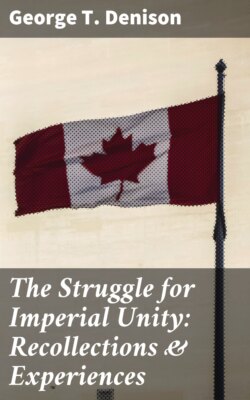Читать книгу The Struggle for Imperial Unity: Recollections & Experiences - George T. Denison - Страница 18
На сайте Литреса книга снята с продажи.
ABORTIVE POLITICAL MOVEMENT
ОглавлениеTable of Contents
Shortly after these events some of our committee were anxious to make a forward movement, to organise a political party to carry out our views, and to start openly a propaganda to advocate them. I opposed this strenuously, saying that the instant we did so the newspapers on both sides of politics would attack us, and that they would have something tangible to attack. The late Daniel Spry urged me very strongly that we should come out openly. I opposed the idea and refused to take any part in it, fearing that it would at the time injure the influence we were beginning to exert.
Foster and I discussed the matter at great length, and my suggestion was that we should go on as we had been going, and that if we ever wished to hold public meetings Dr. Canniff, one of the “Twelve Apostles,” and the oldest of them, the author of “The Early Settlement of Upper Canada,” would always make an excellent chairman, and not being a party man would not arouse hostility. I said, “If we organise a party and appoint a particular man to lead, we shall be responsible for everything he says,” and repeated that the party Press would attack him bitterly and injure the cause, which was all we cared for. Foster supported my views, and during 1872 and 1873 we kept quiet, watching for any good opportunities of doing service to the country.
In the general election of 1872 I was requested by the Hon. George Brown and Alexander McKenzie to go up to Algoma, and either get some candidate to run or run myself in the Reform interest against Lt.-Col. Fred C. Cumberland, the sitting member for the House of Commons. I arrived at Bruce Mines on the same steamer with Col. Cumberland, and he called a meeting of the electors the same evening and asked me to attend. I did not know anyone in the place, but Mr. Brown had given me a letter to Mr. Peter Nicholson, which I presented to him and told him I was going to the meeting. He urged me not to go, but I insisted. He then said he would get a few friends, so that I would not be alone. Col. Cumberland spoke for about an hour, and then called upon me to speak, he well knowing I had come up to work against him. I asked him to introduce me to the meeting, as I did not know anyone; this he did in a very satirical manner. I then spoke for an hour, and attacked the Government very vehemently for their Red River policy and on other points. Very soon the whole meeting was with me, and after it was over the people nearly all came over to Mr. Nicholson’s store and insisted that I should contest the constituency, and, finding I could not get anyone else to run, I consented. Col. Cumberland withdrew the next day from the contest, and the Hon. John B. Robinson was brought out in his place. After a hard struggle I was defeated by a majority of eighty votes. I fully expected to be beaten; in fact, I was surprised the majority was not much greater. There was a very large amount of money spent against me; so large that there was an inquiry in the House afterwards, and something like $6,000, spent by the Northern Railway Company against me, was, I believe, refunded to the company by the directors or the Conservative party. This was my only attempt to enter Parliament.
In November, 1873, I left for England and did not return until the 2nd February, 1874. Shortly after leaving an election came on, and the late Chief Justice Thomas Moss was contesting West Toronto for the House of Commons. Foster thought it would be good policy, as Moss was sympathetic with our views, to organise the “Canada First” party as a political organisation and as such to support Moss. He at once took steps to organise it, and with the old organisation and a large number of others the National Association was established. This was on the 6th January, 1874. Of our old group there were W. A. Foster, Dr. Canniff, Hugh Scott, Joseph E. Macdougall, C. E. English, G. M. Rae, Richard Grahame, James R. Roaf, Thomas Walmsley, George R. Kingsmill; and besides these a number of new associates—W. H. Howland, R. W. Elliott, J. M. Trout, Wm. Badenach, W. G. McWilliams, James Michie, Nicol Kingsmill, Hugh Blain, Jos. A. Donovan, W. B. McMurrich, G. W. Badgerow, C. W. R. Biggar, W. H. Fraser, J. G. Ridout, W. E. Cornell, W. G. Mutton, C. W. Dedrickson, J. Crickmore, Wm. Hessin, J. Ritchie, Jr., R. G. Trotter, A. S. Irving, A. Howell, R. H. Gray, and Dr. Roseburgh.
Foster did most of the work, and I have no doubt drafted the constitution and the platform. He remembered what I had said, and provided that the movement should be guided by an Executive Committee of twelve, without any president or vice-president. The platform was adopted as follows:
